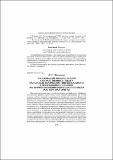| dc.contributor.author | Жигалова, Мария Петровна | |
| dc.coverage.spatial | Гродно | ru_RU |
| dc.date.accessioned | 2022-12-23T10:42:24Z | |
| dc.date.available | 2022-12-23T10:42:24Z | |
| dc.date.issued | 2022 | |
| dc.identifier.citation | Жигалова, М. П. Читательский дискурс-анализ художественного текста как способ взаимодействия вербального и невербального общения (на примере изучения романа М. Булгакова «Мастер и Маргарита») / М. П. Жигалова // Славянский мир и национальная речевая культура в современной коммуникации: сборник научных статей : в 2 частях / Гродненский государственный университет имени Янки Купалы ; редкол.: В. А. Белозорович (гл. ред.) [и др.]. – Гродно : ГрГУ, 2022. – Часть 2. – С. 125–136. – Библиогр.: с. 135 (9 назв.). | ru_RU |
| dc.identifier.uri | https://rep.bstu.by/handle/data/32194 | |
| dc.description | Zhigalova Maria Petrovna. Reader's discourse-analysis of a literary text as a way of interaction between verbal and non-verbal communication (on the example of the study of M. Bulgakov's novel "The Master and Margarita") | ru_RU |
| dc.description.abstract | Предлагается дискурс-анализ психологии героев, который является эффективным способом развития эстетических чувств читателя, приобщения его к более тонкому, глубокому восприятию произведения. На примере текстовых фрагментов романа М. Булгакова «Мастер и Маргарита» показано использование таких приёмов вербального и невербального общения читателя, автора и персонажа, как психологические наблюдения; психологическая партитура переживаний героя; цветовой спектр чувств; словарь описаний голосов, жестов, мимики, взглядов героев; психологическое досье. В процессе чтения текста обращено внимание на речевые высказывания героев и их оформление, детали текста, которые объясняют не только мотивы их поступков, но и характеры. Анализируя интонационные особенности речи героев, своеобразие построения фраз и предложений, тональность, читатель сможет уловить подтекст, а значит, будет способен тоньше, глубже, полнее интерпретировать прочитанное, в котором открываются новые грани мотивов поведения и оттенки переживаемых героями чувств. Дискурс-анализ психологии героев дает возможность не просто читать художественный текст между строк, постигая идейный смысл произведения, его подтекст, а извлекать из подтекста то, что побуждало бы фантазию читателя, давало бы возможность творчески подходить к восприятию содержания, объяснять причины событий или явлений, поступков героев, их душевных переживаний, находить в тексте то, что обращает читателя к анализу собственного внутреннего мира, рождает способность откликаться на те нравственные сигналы, которые посылают герои. Все это помогает не только познать характеры персонажей, уделить при чтении внимание деталям художественного текста, постичь индивидуальный стиль писателя, но и выработать систему отношений к миру, людям, себе. | ru_RU |
| dc.language.iso | ru | ru_RU |
| dc.publisher | ГрГУ им. Янки Купалы | ru_RU |
| dc.subject | текст | ru_RU |
| dc.subject | анализ | ru_RU |
| dc.subject | вербальное и невербальное общение | ru_RU |
| dc.subject | приёмы | ru_RU |
| dc.subject | психология | ru_RU |
| dc.subject | text | ru_RU |
| dc.subject | analysis | ru_RU |
| dc.subject | verbal and nonverbal communication | ru_RU |
| dc.subject | techniques | ru_RU |
| dc.subject | psychology | ru_RU |
| dc.title | Читательский дискурс-анализ художественного текста как способ взаимодействия вербального и невербального общения (на примере изучения романа М. Булгакова «Мастер и Маргарита») | ru_RU |
| dc.type | Статья (Article) | ru_RU |
| dc.identifier.udc | 81’42 | ru_RU |
| dc.identifier.udc | 316.772.2 | ru_RU |
| dc.abstract.alternative | The article offers a discourse analysis of the psychology of the characters, which is
an effective way of developing the aesthetic feelings of the reader, introducing him to a
more subtle, deep perception of the work. Using the example of text fragments of
M. Bulgakov’s novel «The Master and Margarita», the use of verbal and nonverbal
communication techniques of the reader, the author and the character is shown, such as:
psychological observations; psychological score of the hero’s experiences; color spectrum
of feelings; dictionary of descriptions of voices, gestures, facial expressions of the
characters’ views; psychological dossier. In the process of reading the text, attention is
paid to the speech utterances of the characters and their design, the details of the text,
which explain not only the motives of their actions, but also the characters. Analyzing
the intonation features of the characters’ speech, the peculiarity of the construction of
phrases and sentences, tonality, the reader will be able to catch the subtext, which means
that he will be able to interpret what he has read more subtly, more deeply, more fully, in
which new facets of the motives of behavior and shades of feelings experienced by the
characters open up. The discourse analysis of the psychology of heroes makes it possible
not just to read an artistic text between the lines, comprehending the ideological meaning
of the work, its subtext, but to extract from the subtext what would encourage the reader’s
imagination, give the opportunity to creatively approach the perception of content, explain
the causes of events or phenomena, the actions of the heroes, their emotional experiences,
find in the text what turns the reader to the analysis of his own inner world, gives rise to
the ability to respond to those moral signals that the heroes send. All this helps not only
to know the characters of the characters, to pay attention to the details of the literary text
when reading, to comprehend the individual style of the writer, but also to develop a
system of relations to the world, people, yourself. | ru_RU |
